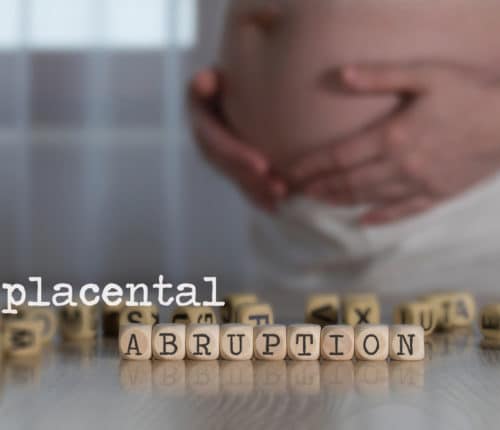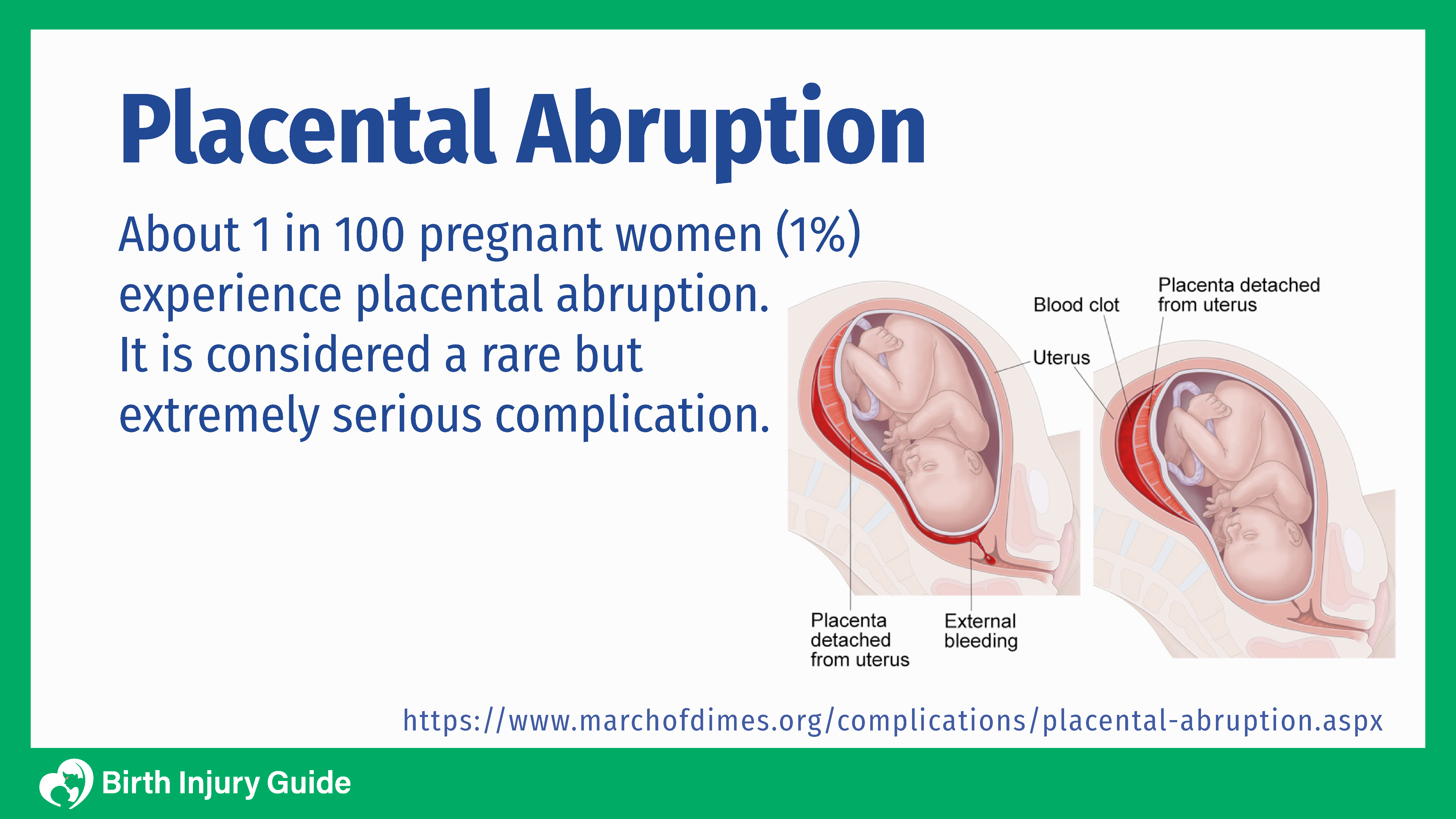
Placental Abruption
Placental abruption, or abruptio placenta, is a rare complication of pregnancy. When it occurs, however, it can threaten the baby’s life. Not only is the mother at risk for health issues, but infants are at risk for conditions that can last a lifetime. In severe cases, placental abruption can even cause death.

What is Placental Abruption?
Placental abruption is the separation of the placenta from the inner wall of the uterus. This usually happens after the 20th week of pregnancy. The placenta is the primary way that infants receive oxygen and nutrients. Normally, the placenta attaches to the wall of the uterus and stays until the baby is born. If the placenta pulls away from the uterine wall before the baby is born, not only is the baby at risk, but the mother may have heavy bleeding. Unfortunately, abruption happens quickly and in many cases without warning.
When the placenta separates from the uterus too soon, the infant is at risk for oxygen deprivation and a lack of vital nutrients. Any sign of a placental problem requires immediate care. Problems with the placenta can be devastating to the health of the mother and baby.
Placental Abruption Symptoms
One of the first and most common signs of placental abruption is severe abdominal and back pain. Pain typically happens suddenly. Vaginal bleeding usually follows. The amount of bleeding will vary depending on the person. While some women will bleed heavily, others may experience light bleeding or no visible bleeding at all. The amount of blood is not an indicator of how severe separation is. Bleeding may occur less in cases where the placenta separates slowly or only partially. That does not mean that the situation is not emergent.
Other symptoms may include:
- Tender uterus
- Extremely rapid uterine contractions
- Abnormalities in fetal heart rate (fetal distress)
- Infant growing slower than expected
- Low levels of amniotic fluid
Causes and Risk Factors
Unfortunately, the cause of placental abruption is still unknown. Experts are continuously searching for answers, however. Experts suggest it may happen due to abdominal trauma or loss of amniotic fluid. There are also some risk factors that may contribute to placental problems, such as:
- Advanced maternal age (40 and older)
- Previous cases of abruption
- Membrane ruptures
- Blood clot disorders
- Carrying twins, triplets (more than one baby)
- Smoking and/or using illegal drugs
- Diabetes
- High blood pressure
- Abdominal trauma
- Unhealthy placenta
Danger to Infants
Physicians and medical staff must react quickly when placental abruption occurs. If not, the effects on the baby can be devastating. Infants can suffer issues including:
- Preterm birth (also called premature birth)
- Stillborn birth
- Oxygen deprivation
- Growth restriction
Increased Risk of Cerebral Palsy
Cerebral Palsy (CP) can develop for various reasons, including complications of the placenta. Since infants suffer oxygen deprivation when placental abruption occurs, the lack of oxygen may lead to brain damage. Brain damage can then lead to CP. The risk of an infant developing CP will depend upon the length of time they go without oxygen. Also, how much of the placenta separated from the uterine wall is a factor. The infant’s age and weight can also be factors.
Treatment Options
As mentioned earlier, there is no way to stop placental abruption once it has started. However, there are a few treatment options that may help the mother and infant. Treatment depends on the severity and other factors.
If an abruption is detected, physicians must start treatment immediately as there is only a small amount of time before devastating consequences occur. To begin with, an electronic fetal monitoring system is usually hooked up to the mother in order to monitor for infant oxygen deprivation and loss of blood flow. Other tests may include blood tests, ultrasounds and assessing the amount of bleeding and pain the mother has. If abruption is assumed, treatment may consist of the following:
Delivery
If there is complete separation, the best course of action is usually to deliver the infant. Quick delivery is key to avoiding lack of oxygen and blood flow. In some cases, a normal delivery is possible if the infant is stable enough and old enough to sustain it. In most cases, however, a C-section is best.
Bed Rest
If testing indicates only a partial abruption and the infant is not in distress, bed rest is typically recommended. Doctors will closely monitor the situation. In some instances, they may perform emergency treatments, such as a blood transfusion, to ensure the safety of mom and baby.
Placental Abruption Prognosis
For mothers, although death rarely happens, they may face a host of health issues following this injury, including:
- A closed cervix
- Excessive blood loss (if not treated, it may lead to shock)
- Concealed uterine bleeding
- In extreme cases, a hysterectomy may be needed
Infants, however, are in a much more dangerous situation. Again, it’s very important for doctors to assess and treat an abruption as soon as possible. According to the American Pregnancy Association (APA), if severe abruption occurs, 15 percent of cases end in fetal death. Infants who survive have a 40-50 percent chance of developing long-term health problems.
Prevention Tips
Even though the cause of placental abruption is unknown, there are some measures that all pregnant women can benefit from, including:
- Avoid drinking alcohol while pregnant
- Don’t smoke cigarettes or use any recreational drugs
- If you’re diabetic, monitor your blood sugar closely and try to keep it under control as much as possible
- Keep all prenatal appointments and get regular checkups
- Keep on eye on your blood pressure levels



